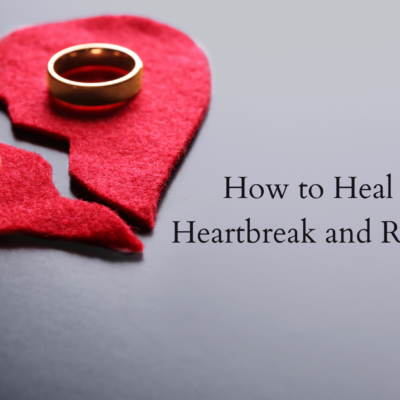How to Heal from Heartbreak and Rejection: Heartbreak and rejection are among the most painful experiences in life. They leave a lasting impact on our emotions, self-esteem, and perspective on relationships. While the pain may feel overwhelming, it’s important to remember that healing is a journey, and with time, patience, and self-care, you can come out stronger and more resilient.
This article will guide you through practical steps to heal from heartbreak and rejection, allowing you to rebuild your confidence and embrace a brighter future.
Also Read:
- How to Heal after Breaking up With Someone You Love?
- Ideas for Dealing with a Husband with Anger Issues.
How to Heal from Heartbreak and Rejection?
1. Acknowledge Your Pain
The first step in healing is to accept and acknowledge your feelings. It’s natural to feel a mix of sadness, anger, confusion, and loneliness after heartbreak or rejection. Bottling up these emotions only prolongs the healing process.
- Journal your thoughts: Writing about your emotions can help you process them better.
- Talk to someone you trust: Sharing your feelings with a friend, family member, or therapist can provide relief and perspective.
Give yourself permission to grieve the loss of what you hoped for in the relationship or opportunity.
2. Allow Yourself Time to Heal
Healing doesn’t happen overnight. Don’t rush the process or feel pressured to “move on” quickly. Understand that it’s okay to take time to recover.
- Avoid comparing your healing journey with others.
- Set realistic expectations for yourself; healing comes in waves, and it’s okay to have good and bad days.
3. Cut Off Contact
Maintaining contact with the person who caused the heartbreak or rejection can hinder your recovery. A clean break allows you to focus on yourself and gain clarity.
- Block or unfollow on social media: This prevents you from constantly checking their updates, which can reopen emotional wounds.
- Avoid unnecessary interactions: Minimize situations where you might run into them, at least temporarily.
4. Focus on Self-Care
Taking care of your physical and emotional well-being is crucial during this time. Prioritize activities that nurture and rejuvenate you.
- Exercise: Physical activity releases endorphins, which improve mood and reduce stress.
- Eat healthy: A balanced diet helps maintain energy and supports mental health.
- Sleep well: Rest is essential for emotional recovery. Establish a calming bedtime routine.
Engage in self-soothing activities like reading, meditation, or taking long walks in nature.
5. Reflect on the Experience
Heartbreak and rejection, while painful, can also offer valuable lessons. Take time to reflect on the experience to gain insight into yourself and your relationships.
- Identify patterns: Are there recurring themes in your relationships or choices?
- Learn from the past: What did this experience teach you about your needs, boundaries, or values?
Reflection helps transform pain into growth and self-awareness.
6. Rediscover Yourself
When a relationship ends or rejection occurs, it can shake your sense of identity. Use this time to reconnect with who you are outside of the relationship or situation.
- Explore hobbies and interests: Revisit old passions or try something new, like painting, hiking, or cooking.
- Set personal goals: Focus on areas of your life you want to improve, such as career, fitness, or education.
Rediscovering yourself reminds you of your worth and independence.
7. Surround Yourself with Supportive People
Having a strong support system is essential during difficult times. Spend time with people who uplift and encourage you.
- Lean on loved ones: Share your thoughts and feelings with close friends or family members.
- Join support groups: Connecting with others who’ve experienced similar challenges can provide comfort and understanding.
Positive relationships help rebuild trust and remind you that you’re not alone.
8. Practice Forgiveness
Holding onto anger or resentment toward the person who hurt you can delay healing. Forgiveness doesn’t mean condoning their actions; it’s about freeing yourself from negative emotions.
- Forgive yourself: Let go of any guilt or regret you might feel about the situation.
- Forgive them: Release the emotional burden by choosing peace over resentment.
Forgiveness creates space for healing and emotional freedom.
9. Embrace Gratitude
Shifting your focus from what you’ve lost to what you have can bring a sense of peace and contentment. Gratitude helps you appreciate the positive aspects of life, even during tough times.
- Keep a gratitude journal: Write down three things you’re grateful for each day.
- Celebrate small wins: Acknowledge progress in your healing journey, no matter how small.
Practicing gratitude cultivates a positive outlook and promotes emotional resilience.
10. Avoid Rebound Relationships
Jumping into a new relationship immediately after heartbreak may seem like a quick fix, but it often complicates emotions. Take time to heal and rebuild your self-esteem before pursuing new connections.
Focus on becoming emotionally whole so that future relationships are built on a strong foundation.
11. Seek Professional Help if Needed
Sometimes, heartbreak and rejection can lead to feelings of deep sadness or anxiety that are difficult to manage alone. Seeking help from a therapist or counselor can provide valuable tools and coping strategies.
- Therapy sessions: A licensed professional can help you navigate complex emotions.
- Support groups: Sharing experiences with others who’ve been through similar situations can be healing.
Don’t hesitate to seek help if you feel stuck or overwhelmed.
12. Look to the Future
Heartbreak may feel like the end, but it’s actually a new beginning. As you heal, shift your focus toward the opportunities and possibilities that lie ahead.
- Visualize your ideal life: What do you want to achieve or experience in the future?
- Create a vision board: Collect images and words that represent your goals and dreams.
By focusing on the future, you remind yourself that better days are ahead.
13. Celebrate Your Strength
Enduring heartbreak and rejection requires immense emotional strength. Acknowledge your resilience and give yourself credit for navigating such a challenging time.
Each step you take toward healing is a testament to your courage and determination.
Conclusion
Healing from heartbreak and rejection is a deeply personal process that takes time, effort, and self-compassion. By acknowledging your feelings, prioritizing self-care, and surrounding yourself with support, you can navigate this difficult period and emerge stronger.
Remember, heartbreak is not the end—it’s a stepping stone toward personal growth, self-discovery, and new beginnings. Trust in the process, and be patient with yourself. The pain will fade, and you’ll find joy and love again, starting with the love and kindness you show to yourself.








